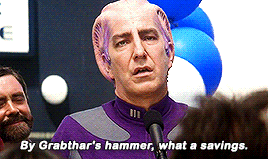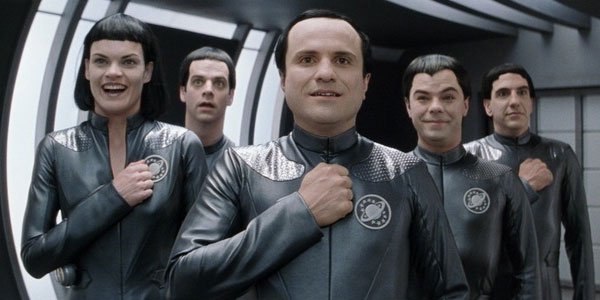I've had an itch to rewatch Galaxy Quest for a while, which I finally scratched a few days ago. The (perfectly legal, ofc) platform I watched it on also had the Never Surrender documentary about the making of the movie and its reception, so I watched that, too.
I loved the movie just as much as I did when I first saw it ten-ish years ago. If you haven't seen it, then go watch it. And if, for some weird reason, you'd rather finish reading this before doing so but still want understand what's going on, then here's a quick summary:
An old sci-fi TV series named Galaxy Quest1 got intercepted by an alien civilization who mistook it for historical documents about a real crew of space explorers, which prompts them to come to earth and enlist the cast of actors to help them against an evil opponent who threatens to invade/anihilate them.
It's a simple enough premise for some feel-good, light-hearted comedy, but it also touches on a theme that always resonate pretty strongly with me, which is the power of storytelling.
Richard III's hammer
The documentary talks at length about how important this movie was to trekkies and fans of other fantasy / sci-fi franchises. It's basically a love letter to those communitites, poking some gentle fun at their nerdiest aspects without ever being condescending.
Everyone is a fan of the show. The cast gets to be their characters in a real, high stake situation and use actual working magic-tech instead of props. The Thermians2 modelled their entire society after what they could glean from the old footage, and even the obsessive kids from the convention get to save the day thanks to their deep knowledge of the fictional ship's innards that no "sane" person would ever care about.
The whole plot is people acting out their fantasy, but there's more going on here than children playing make-believe. Everyone cares deeply about the story they're a part of, and whatever that story might mean to them, it means something.
Art doesn't have to be grandiose, and it certainly doens't have to fit whatever standard the snobs have set for themselves. If it moves someone, anyone, no matter how or why, then it's worth it.
As Alan Rickman's character will realize, there's no more shame in being inspired by the Suns of Worvan than by anything Shakespeare might have written.

Why stories matter
The general love and appreciation for the fans I just described is probably the one thing most people took from the movie, and is explored at length by both audience and crew in the documentary that was shot twenty years after the movie's release.
But what I trully liked is how it can be taken one small step deeper.
On the surface level, this story is about fantasies becoming reality. But I tell myself more and more that stories are real to begin with.
Not in a litteral way, of course. We all know spaceships and dragons don't exist. But whether or not we wish they did is beyond the point.
Stories are fundamantally about people, what happens to them and how they chose to deal with it. Everything else is window dressing.3 And when something clicks and you connect with a character's predicaments, who's to say whatever you're feeling is not genuine ?
None of the stuff that happened in the Galaxy Quest show was ever "real". It was all actors and cardboard props. And yet the thermians, who do not understand the very concept of lying, and therefore fiction as a whole, took it all at face value and built their entire culture out of what the show was embodying.
When they finally learn the truth, their whole world could crumble. But it doesn't, because whether or not it was founded on fairy tales, what they built was strong enough to keep standing on its own.
This is what stories are. A bunch of lies lumped together that somehow manages to brush with whatever truth the artist is trying to say. You know, the human condition and all that jazz. It doens't have to be particularly deep or smart, as long as it resonates. And when enough people believe in that truth, we end up with religion.4
This is why treating them as mere "content" is so infuriating, and why I get pissed whenever someone dismisses nerdy nitpicking as obsessing over "just a story".5
I clumsily tried to touch on this in the conclusion to my star wars article. Hopefully I made my point a bit more clearly this time around.
Galaxy Quest isn't the first piece of media to touch about what storytelling is all about, but it's the last one I saw, so it's the one this articles focuses one. Again, if you haven't seen it, go ahead. You'll have a good time, and what minor details I covered shouldn't spoil it.
Sharing stories is what makes us humans. For better or for worse. So let's keep doing that. Old or new, doesn't matter. The magic is in the telling.
This is what we should never surrender.
-
They had to use another name for legal reasons, but it's basically Star Trek. ↩
-
That's the name of the alien species who get this whole thing started.
Don't they look great? (Click for full size) ↩
-
Not that it's not important. Worldbuilding can get fascinating in its own right, and there's nothing wrong with getting lost in it for its own sake.
I'd argue that no one would care about the history of Middle Earth if Frodo's story hadn't been told right to begin with, though. ↩
-
Some nerds can be the worst zealots. Taking that stuff seriously doesn't mean sacralizing it, and we could all do with less bonfires. ↩
-
Although I'll admit there's a time and place for it. Sometimes I / we might get a bit carried away. See the previous footnote. ↩
